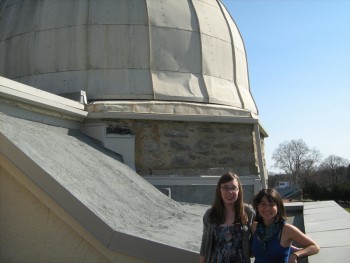Student Organizers Expand Public Observing Program

Megan Bedell '12 (left) and Maya Barlev '12 at the Strawbridge Observatory.
Details
The Strawbridge Observatory—built in 1852—is one of the oldest astronomical observatories in the country, and its long history includes many years of public outreach. According to Emeritus Professor of Astronomy Bruce Partridge, the Public Observing program, in which community members are invited to campus to stargaze and learn about the solar system using the College's telescope, dates at least back to 1970, his first year at Haverford.
“Public outreach has always been important for astronomy in general,” says Stephen Boughn, the John Farnum Professor of Astronomy and one of the advisors to the program.“The public has a keen interest in the cosmos, and astronomy has
benefited greatly from public support. Also, Public Observing at Haverford is important for the College's relations with the outside community.”
In keeping with the College's intimate, hands-on approach to learning, undergraduates have always acted as assistants to the professors, like Boughn, who have been tasked with planning these observing events. But over the last five years, they have taken charge of the program, turning it into an essentially autonomous, student-run initiative.
“Without a doubt, Public Observing, in the hands of astro students, has been much more organized and extensive in the last couple of years,” says Boughn, who also credits Assistant Professor of Astronomy Beth Willman, another advisor, with the quality of the program increasing as of late.
This year, Maya Barlev '12 and Megan Bedell '12 are co-directing the program, and according to Boughn, they are doing a“superb” job. Under their leadership Public Observing has expanded to include bi-monthly viewings and the first-ever film screening (The City Dark, which is being shown Sunday, March 18). Though families and stargazers of all ages were always welcome at past Public Observing events, Barlev and Bedell have created specific programming to cater to“junior astronomers” and devoted particular nights to them.
Running the program is not only a chance for these ambitious astronomy students to teach others, but also gives them another, less academic, perspective on their chosen field.“Working at Public Observing is a chance for me to step back from my problem sets and research and remind myself of how fascinating and beautiful astronomy is,” says Bedell, an astronomy major.“I really love seeing the awe on peoples' faces when they look at the Moon's craters or a galaxy through the telescope for the first time.”
For Barlev, who was recently awarded a Watson Fellowship to travel to Chile, South Africa, Sri Lanka and New Zealand next year to investigate how children around the world perceive the universe, working with the program has not only enriched her academic experience at Haverford, but has also helped her prepare for her future career.
“My work with the public observing program has given me the foundation for what I hope to do for the rest of my life,” she says.“With my degree in astrophysics from Haverford, I plan on pursuing a career in astronomy education. I think that astronomy is phenomenal in its potential to inspire excitement for science and wonderment [about] our own place on Earth. By viewing the night sky with a cosmological perspective, people, including children, learn to grasp—or admit that it's impossible to grasp—the vastness of our universe, and how we occupy such a small corner of it.”
Public Observing encompasses more than the student talks, observatory tours, children's activities (which include making paper-bag space helmets) and now film screenings that Barlev and Bedell plan. It also offers special events by request. Last semester, a group of 20 students from Harriton High School scheduled their own personal visit to the Observatory, and after a talk on“cosmic collisions” by Emily Cunningham '12, they got quite an eyeful at the telescope.
“Coincidentally, that was also the same night as the Geminid meteor shower, and students were amazed by everything they could see in the night sky,” says Barlev.“It was also the first major meteor shower I experienced, and it was wonderful sharing that.”
Both Barlev and Bedell stress the importance of public outreach in the world of astronomy, and hope that their events are helping non-astronomers learn a little something about the world in which they live.
“I hope that when [people] come to our events, they walk away knowing something they didn't know before, inspired to learn more,” says Barlev.“I also hope they gain a sense of perspective by understanding how vast our Universe is beyond our planet, and that this may lead to an appreciation of the Earth and our relationship to it and to others who live on it.”
“It's especially important to reach out to kids at these events,” adds Bedell,“and encourage them to stick with science in school, since they could be the next generation of astronomers!”
-Rebecca Raber
The Public Observing Program will screen The City Dark at 7:00 p.m. on Sunday, March 18, in Stokes Auditorium. The next Public Observing event at Strawbridge Observatory will be March 27 at 8:00 p.m.



